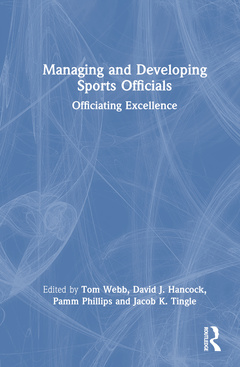Description
Managing and Developing Sports Officials
Officiating Excellence
Coordinators: Webb Tom, Hancock David J., Phillips Pamm, Tingle Jacob K.
Language: English
Keywords
Sports Officials; Officiating; History; Governance; Workforce; On-Field Personnel; Inclusive; Equitable; Supportive; Recruitment; Retention; Career Development; Community; Culture; Mentoring; Mental Health; Skills; Decision-making; Knowledge; Perceptual-Cognitive Expertise; Biases; Movement; Positioning; Awareness; Fitness Testing; Performance; Group Dynamics; Interactions; Mental Toughness; Resilience
Publication date: 08-2024
· 15.6x23.4 cm · Hardback
Publication date: 08-2024
· 15.6x23.4 cm · Paperback
Description
/li>Contents
/li>Readership
/li>Biography
/li>
This book offers an evidence-based guide to the development, management and retention of sports officials. Drawing on research at all levels of sport, from grassroots to professional, the book focuses on best practice, for sports officials and for anybody involved in the management or training of sports officials.
The book is divided into three sections. The first takes a close look at who sports officials are, their motivations, and the formal and informal organisational relationships that define an official?s position in sport. The second examines the factors that can keep an official engaged in their sport, from building healthy cultures and good physical preparation, to mentoring and mental health. The final section looks at the development of officials to elite level, including effective communication, improving decision making, interpreting rules and laws, and career pathways. With case studies, real-life examples and the voices of practising officials included throughout the book, it introduces core concepts and best practice applicable across sports and different national and international contexts.
This is an essential reference for all sports officials and for practitioners and policy-makers working in sports organisations at all levels.
1. Introduction, Part I: Sport Officiating History, Governance, and Workforce, 2. Historical and Sociological Perspectives of Officiating, 3. Coordination of Officials, Governing Bodies, and On-Field Personnel, 4. Profiling the Official Workforce, 5. Part I Editor’s Conclusion, Part II: Recruiting, Retaining, and Supporting Sport Officials, 6. Inclusive, Equitable, and Supportive Environments are Essential to the Recruitment and Retention of Sport Officials, 7. Career Development of Officials, 8. Building Community and Culture for Sports Officials, 9. Mentoring in Officiating, 10. Mental Health in Sports Match Officials, 11. Part II Editor’s Conclusion, Part III: Developing and Testing Sport Officials’ Skills, 12. Building Knowledge of the Game to make Effective Decisions, 13. The Acquisition of Perceptual-Cognitive Expertise in Sports Officials: Can we make the Human Brain Smarter and Faster?, 14. Sports Officials’ Decision-Making Biases, 15. Movement, Positioning, and Awareness for Officials, 16. Fitness Testing and Preparation for Performance, 17. Group Dynamics and Managing Interactions, 18. Mental Toughness and Resilience in Officiating, 19. Part III Editor’s Conclusion, 20. Conclusion
Tom Webb is Associate Professor in the Centre for Business in Society at Coventry University, UK. His research focuses on abuse, aggression and maltreatment of sports officials, the mental health and well-being of sports officials and the governance and careers of officials. He is also founder of the Referee and Match Official Research Network.
David J. Hancock is Associate Professor in the School of Human Kinetics and Recreation at Memorial University of Newfoundland, Canada. His primary research interest is centred on understanding the psychology of sport officiating, including group dynamics, mental health, and decision-making.
Pamm Phillips is Professor at the Deakin Business School, in the Faculty of Business and Law at Deakin University, Australia. She is a member of the Centre for Sport Research, and the Women in Sport and Exercise group. Prof Phillip’s research is focused on volunteers (including referees) and sport development.
Jacob K. Tingle is Associate Professor in the Michael Neidorff School of Business at Trinity University, USA. His research explores organizational systems and structures which enhance or detract from the experiences of sport volunteers and contract staff. Sports officials (referees and umpires) are a population of significant interest.




